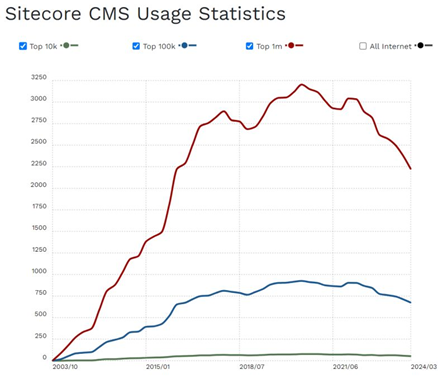Mass migration from Sitecore to other equally powerful DXPs like Umbraco, Kentico and Optimizely

Businesses are constantly seeking platforms that can provide them with the best tools to deliver outstanding digital experiences. Digital Experience Platforms (DXPs) have become essential for companies looking to engage their customers through personalised and dynamic content. One of the well-known names in this field is Sitecore, a platform that has been a leader in the DXP space for many years and one we continue to work extensively with. However, there is a noticeable trend of businesses migrating from Sitecore to other platforms and here’s the reasons why.

BuiltWith registered significant drops of Sitecore platform usage (July 2024)
Complexity and Cost of Implementation
One of the most significant challenges companies face with Sitecore is the complexity of implementation. Sitecore is a powerful platform, but it requires a high level of expertise to set up and maintain. This complexity often leads to increased costs for businesses, as they need to hire specialised developers or agencies to manage their Sitecore environments. Additionally, Sitecore’s licensing costs can be prohibitive for small to medium-sized businesses, prompting them to seek more cost-effective alternatives.
Flexibility and Customisation
While Sitecore offers a range of features out of the box, some businesses find that the platform lacks the flexibility they need for their unique requirements. As companies grow and their needs evolve, they often require more customisation options than Sitecore can provide without significant development work. Other platforms like Umbraco and Kentico offer more agile and modular architectures that allow businesses to build tailored solutions more easily, appealing to companies that need to adapt quickly to market changes.
Integration Capabilities
The ability to integrate seamlessly with other systems is crucial. Businesses are looking for platforms that can easily connect with their existing tools and technologies, such as CRM systems, marketing automation platforms, and analytics tools. While Sitecore does offer integration capabilities, some users find it challenging to connect with other systems, leading them to seek platforms with more robust and user-friendly integration options.
Focus on Headless Architecture
Not to mention the rise of headless CMS solutions have changed how businesses approach digital content management. A headless CMS separates the backend content management from the frontend presentation layer, providing more flexibility in how and where content is delivered. This approach is particularly appealing for companies looking to deliver content across multiple channels, such as websites, mobile apps, and IoT devices. Many businesses are migrating to headless platforms that offer greater freedom and future-proofing capabilities, something that Sitecore has been slower to adopt compared to newer platforms.
Improved User Experience and Performance
Performance and user experience are critical factors for businesses when choosing a DXP. Some companies have experienced performance issues with Sitecore, particularly as their content and user base grow. Slow loading times and complex workflows can frustrate both content creators and end-users. In contrast, other platforms prioritise speed and ease of use, offering intuitive interfaces and faster deployment times. These are attractive to companies looking to streamline their operations and improve customer satisfaction.
Open-source Alternatives
The growth of open-source DXP platforms presents an attractive option for businesses looking for more control over their digital experience infrastructure. Open-source platforms often offer greater transparency, flexibility, and community support, allowing companies to tailor their solutions to meet specific needs without being locked into vendor-specific technologies. This level of control is appealing to businesses looking to innovate and differentiate themselves in competitive markets.
In Summary
The migration from Sitecore to other DXP platforms could be driven by a combination of factors, including cost, complexity, flexibility, integration capabilities, and the desire for modern, agile solutions. While Sitecore remains a powerful and respected platform, the technology landscape's dynamic nature means that businesses are continually reassessing their tools to ensure they align with their goals and needs.
As technology continues to evolve, the choice of a DXP platform will remain a strategic decision for businesses seeking to provide exceptional digital experiences. By understanding the reasons behind these migrations, you can make informed choices about the platforms that best support their digital transformation journeys.
If you would like to speak with one of our experienced team members to help assess what is the right DXP choice for you, please feel free to contact us.




